- Home
- Richard Flanagan
Gould's Book of Fish: A Novel in Twelve Fish Page 4
Gould's Book of Fish: A Novel in Twelve Fish Read online
Page 4
To those who continued swimming past my prostrate form into the gaming bar my pictures of silver dories and stargazers were, I realised, useless; as pointless to them as a row of two lemons and a pineapple, as disappointing as a busted flush. All the fish lacked in their eyes was the sign across their images announcing our mutual destiny in blinking letters—
‘GAME OVER.’
X
AFTER MR HUNG had lost all my money he came back out, promised he would repay me soon, and took me to his Zinc Company home in Lutana. We entered quietly, as his wife and children were asleep. He disappeared into his kitchen to cook us some soup and left me in his small lounge-cum-dining room.
In a corner was a shrine to Victor Hugo. On a green velvet cloth there was propped a red plastic frame housing a photocopied lithograph of the great man, arrayed around whom were two unlit candles, four burnt incense sticks, several paperback novels, and some puckering apricots.
Next to the shrine sat an aquarium, in which Mr Hung kept a large pot-bellied seahorse and a similar creature, a good foot long, covered in delicate leaf-like fins, which he later told me was a weedy seadragon, both like pictures I had seen in the Book of Fish. I gazed on these alien beings that seemed to float so serenely.
Bony-ringed, tube-snouted, the pot-bellied seahorse’s small fins fluttered as furiously as a blushing debutante’s fan. He had pectoral fins on his cheeks with which he steered himself, a combination of sideburn and steering wheel. Mr Hung appeared next to me with two bowls of steaming soup. As he set these down on the table, he explained to me the seahorse’s capacity to transform, how the male gave birth to hundreds of tiny seahorses that it had incubated in a brood pouch.
And then, as if on cue, the seahorse began to give birth. I watched, mesmerised, as before my eyes he jerked back and forth in an anxious pumping movement, and every minute or so another one or two black baby seahorses would shoot out of a vent in the centre of his swollen belly as he painfully flexed: tiny little black sticks which would immediately start swimming, with only their large eyes and long tube snouts recognisable, so many rising and falling curlicues. They were like Gould’s lost words, and I felt a little like the poor seahorse at the end of his prolonged labour; his formerly swollen belly now flaccid, exhausted with all his awkward motions.
My gaze turned to the weedy seadragon, which was, I had to agree with Mr Hung, a magnificent creature. The weedy seadragon swam horizontally like a fish, rather than vertically like the seahorse, but like the seahorse its movements were beautiful: it hovered up and down, forwards and sideways, like a hovercraft crossed with a helicopter, a jump-jet in rich mufti. Its luminous colouring was exquisite—its trunk pinkish red, purple blacks and silver blues spotted with yellow dots, billowing around which were its mauve leaves. Yet there was a serene grace about it that was also the oddest melancholy. As well as wonder, it shimmered sadness.
I was not then a weedy seadragon, and so I could not sense its terrible imprisonment, which was endless. I fancied I understood its horrific calmness; only a lifetime later would I truly comprehend the reason for such: that sense that all good and all evil are equally inescapable. Yet understanding all, the weedy sea dragon seemed troubled not at not being understood.
I put my face to the glass, stared closer, trying to fathom its descending mystery. Then I imagined the weedy seadragon’s beauty arose out of some evolutionary necessity; to attract mates possibly, or to merge with colourful reefs. Now I know beauty is life’s revolt against life, that the seadragon was that most perfect of things, a song of itself.
There was a moment of transition that was abrupt: enlightenment is too smooth a word for the jolt I felt. It was a dream, but only much later was I to realise that there would be no awakening. With that long snout the seadragon was touching the other side of the glass to which my face was pressed. Its astonishing eyes rotated independently of each other, yet both were at different angles focused on me. What was it trying to tell me? Nothing? Something? I felt accused, guilty. I began whispering at the glass, hissing almost angrily. Was it asking of me questions to which I had no answer? Or was the seadragon saying to me in some diaphanous communication beyond words: I shall be you.
And shall I, I wondered, be you?
Other than the slightest movements of its leafy fins, I know the seadragon did not move while I muttered away, just stared out and through me in the most awful, knowing way with its unruly peepers.
I stopped talking.
Perhaps I stared too long.
Whatever, there was a momentary sense that was both a sickening vertigo and a wild freedom. I was without weight, support, structure; I was falling, tumbling, passing through glass and through water into that sea dragon’s eye while that seadragon was passing into me, and then I was looking out at that bedraggled man staring in at me, that man who would, I now had the vanity of hoping, finally tell my story.
THE KELPY
The invasion of Australia—An unfortunate misunderstanding—Barrels of black heads—The King & I—The error of Jean-Babeuf Audubon—Birds as burghers—Captain Pinchbeck & the French Revolution—Black War—Clucas the banditto—His perfidy—The Cockchafer—Tragic death of the machine breaker—Bonfires of words.
I
MY OWN SMALL part in the great invasion of Van Diemen’s Land as we then knew it—Tasmania, as its native-born now prefer it, shameful of stories of the type I tell—has hitherto not been recorded, but I believe my role one worthy both of record & reflection.
Ever since that moment in 1803 when as a boy I first leapt off the whale boat with Mr Banks’ pistol sticking in my back, just in case my resolve might falter, & fell face first into the choppy waters of Risdon Cove, both me & this country seem to have been in trouble.
I half-swam, half-staggered ashore with what I thought was the red ensign of the Union, & planted it most firmly on the beach & claimed the soil of the vast nation that spread out before me in the name of the glorious union that the ensign above me signified. But when I dropped my salute & proudly looked upwards, I saw fluttering what proved to be a yellowed sheet soiled with long clouds from Lieutenant Bowen’s languid afternoons with the Samoan princess Lalla-Rookh.
I received seven years for theft of personal property, a further fourteen years for insubordination & twenty-eight years on top of that for mockery of the Crown. It wasn’t, it is true, the term of my natural life, which would have only been a kindness, but imprisonment forever.
And that’s more or less how it’s turned out. I did manage to go on the lam & escape the following year on a whaler to the Americas & from there finally back to England—where I lived the life of a rat under different names for the next twenty years, until I once more was apprehended & transported back here. Really the only thing that keeps me battling on now is not the thought that I will one day be released, but that they are finally going to do the decent thing & kill me like they should have done all those years ago.
Lieutenant Bowen, in his fury, took the subsequent arrival of a few hundred blacks out with their families hunting kangaroo as a declaration of war, & immediately ordered our cannons to be opened upon their clustering mob on the seashore, leaving some forty-five dead men, women & children on the sand, & who knows how many more whom their countrymen dragged off with them to die in their distant camps.
Mr Banks was delighted to find most of their black bodies still intact, as well as a good measure of artifacts—spears, fine shell necklaces, reed baskets, skins & the like—& while I was shackled to a tree to await my sentencing, my fellow convicts got on with the severing & pickling of the heads of the blacks. Mr Banks was well pleased with the half-dozen barrels of bobbing heads when they were finally presented to him, feeling, said he, that they could only greatly enhance our understanding of such misbegotten issue of the human race.
When the seawater laps up again at my festering ankles, I think back on those wallowing black heads with their milky eyes curding up in disbelief, & neither they nor I can see
then just how much trouble black heads would later get me into. When I once more feel that sharp smarting around the scabby sores that cluster like so many oysters on my ankles beneath my chained iron basils, I know that the tide has turned. Then this cell, built at the base of sandstone cliffs below the high water mark—one of those infamous fish cells you have no doubt read about in those lying street pamphlets that circulate about the bushranger Matt Brady’s cruel incarceration & subsequent villainous career—will fill to above my head.
Not that I will drown: I will, as others before me have, hang onto the bars above my head for several hours, holding myself up in the foot of air space that remains at the top of the cell at high tide. Sometimes I let go & allow myself to drift around my small kingdom, hoping I might die as I do so. Sometimes I count my blessings as I float: this twice-daily bath lately seems to have rid me of my lice, & the cell, while damp & prone to a briny, seaweedy odour, is not redolent of the dreadful stench of shit & rancid he-goat that normally prevails.
Two blessings: that’s a sufficient challenge for my powers of mental arithmetic. And floating in the cold water, shivering & shuddering as if I were already in rehearsal for the old diddly-back-step off the gallows that awaits me, my mind sometimes breaks loose, & I am back happily painting the fish once more.
Call me what you will: others do, & it is of no matter to me; I am not what I am. A man’s story is of little consequence in this life, a pointless carapace which he carries, in which he grows, in which he dies. Or so the porcupine fish said, & he is, as ever, already sticking his bloated head in where it’s not wanted. What follows may or may not be my true story: either way it is of no great importance. Nevertheless with the porcupine fish dead & the old Dane now gone, I simply want to tell the tale of my paltry paintings, before I too join them.
It’s not because I think the future is like this darkened, wet cell, on the damp sandstone walls of which you might scratch your name alongside so many others before you too disappear like the last tide, vanished; that vanity of thinking such words as these might at least remain as evidence, a flotsam of freedom dashed, that might endear my memory to posterity. I am, in any case, too far gone to place hope in such games. The truth is that at first I had a queer desire to confess something of it, & later it had simply become a bad habit, as inescapable & as wretched as scratching my licy balls.
Not that I would want you to think that I am not well looked after. Far from it. Sometimes they bring me a taj of skilly & rancid pickled pork fat in a cup or a bowl, & they throw it at me. Sometimes I smile back, & if & when I am feeling especially energetic, I’ll lob a turd I’ve kept especially for the occasion in return. Sometimes after such a happy exchange they give me a good walloping as well, & I thank them for that too, because it shows they still care a little. Thank you very much, dearies, I say, thank you thank you thank you. They laugh about that too, & between the beatings & the turd-tossing I can tell you we really do all get along splendidly. ‘That’s the good thing about an island prison colony,’ I whisper to my cell door, ‘we are all in this shit together, all the turnkeys & redcoats & even the Commandant himself. Aren’t we? Aren’t we?’
‘No!’ yells the turnkey Pobjoy from the other side as he slides the latch, but I won’t hear him, because he’s not allowed into the story yet, & once he is, like me, I promise you he won’t escape either.
I know I ought make it clear from the beginning why I have come to be painting fish, & why the fish paintings came to be of such importance to me, but really, nothing is clear to me any more, & the whole matter seems beyond comprehension, far less explanation. I can tell you that there are no pictures of convicts ever made at this settlement, & that the very making of such pictures is forbidden upon the pain of the severest punishment.
It is, if you ponder it only for a moment, a curious fact that no visual record will survive this time & place, not one single painting of the maimed, of the broken, even of the Commandant. There are, it is true, the written records of the settlement contained in its great Registry—a mysterious archive whose location is kept secret from the convicts lest they try to tamper with their records. In this reputedly labyrinthine repository, it is said the details of every convict & every event of the island’s past are meticulously recorded, no detail too insignificant to elude cataloguing & chronicling.
But I won’t pretend that my fish are some alternative, upside-down Registry. My ambitions are neither gargantuan nor comprehensive.
At best a picture, a book are only open doors inviting you into an empty house, & once inside you just have to make the rest up as well as you can. All I can show you with any conviction is a little of what happened to me here—the whys & the wherefores, that’s so much waffle for the judges with their black caps & powdered wigs, for the criticasters & their like: guilt, sin, motivation, inspiration, what is good, what is bad—who knows? Who cares? All I can say is that between the beatings & the high tides the turnkey Pobjoy has brought me some cheap parchment stolen from the Registry on which he has instructed me to paint Constable-like scenes of bucolick bliss: all happy haymaking & rustick idiots like Pobjoy himself, & wagons crossing sun-dappled English streams, which he can then sell or trade with others.
The gawky Pobjoy stands on the frontier between men & giraffes; he is so tall that when he comes into the cell he has to bend over nearly double, so that it seems it is he prostrating himself to me, rather than—as it must be in our situation—the other way around. I have to bow so low to get beneath Pobjoy that I am almost blowing bubbles in the slimy rock pools at our feet, disturbing my friends that cluster in the darkness there, the crabs & periwinkles & mussels that share this demimonde with me.
‘Thank you thank you thank you,’ I say to all those who like me live in the sea slime, & set to work as quick as buggery before the water rises, because each day I have to complete not one painting but three tasks: first, a painting of pastoral pieties for Pobjoy; second, a painting of a fish for me; & third—the job with which I am always running behind time, & ever failing to say all the things I need & wish—these notes that are to accompany my fish.
II
GIVEN THE KEEPING of any private accounts of the island by a convict is an offence for which even more savage punishment than that meted out for painting is reserved, I have to proceed carefully. Each day Pobjoy takes my paints & paper away with his newly completed Constable fake, checks that not too much paint seems to have disappeared,
& that the amount of paper left equates with what I tell him I have wasted on rough cartoons & then used to wipe my bum—a rare privilege Pobjoy in his infinite generosity occasionally affords a craggy-arsed convict such as me, on the grounds that as an Artist my delicate orifices are unaccustomed to indignity.
Each day I purloin a few more sheets for the purposes of my book of fish which I carefully hide, & each day I rearrange prominently in the cell corner where the light hits as the cell door opens the same single crumpled sheet of paper kept specially for the purpose, which I have streaked artfully with some particularly strong greens & browns. In its moist colourings it serves as corroboration of my tale of personal hygiene & is, I believe, consistent with both the facts of my diet & my complaints to Pobjoy of bad gripe in the guts. Mercifully, Pobjoy has not yet been tempted to investigate the matter further.
Having paint but no ink I have to use whatever is at hand to write—today, for example, I have knocked a few scabs off my elbow & am dipping my quill carved from a shark’s rib into the blood that oozes slowly forth to write what you are now reading. Blood’s thicker than water, as they say, but then so too is porridge, & I don’t attach any more symbolic significance to what I am doing than I do to rolled oats. If I had a bottle of good Indian ink, I’d be a hell of a lot happier, & in somewhat less pain. On the other hand, mine is far from a black & white story, so perhaps putting it down in a scarlet fashion is not so inappropriate. Please don’t be appalled, compared to most of the vile crap that comes out of my body these days,
the mossy mucus & yellow pus & runny shit, my blood really is quite pure & beautiful, & it reminds me that something is always pure & beautiful, if you will just look beneath the scabs & sores.
In any case, colour is a tragedy that should not be taken seriously: ‘That God is Colouring Newton does show,’ wrote Ackermann’s woolly cobber Billy Blake. Even Billy Blake’s wife never knew him to wash & his opinions could sometimes be as ripe as his presence. As far as I am concerned, ever since Newton broke white light with his prism into multifarious colours, the rainbow’s divided light is for me nothing other than this ridiculous fallen world.
When the water rises to my belly, I hide my fish & these bloody thoughts, then yell at the door until Pobjoy comes to fetch his convict-Constable. And what a splendid spot I have for my book of fish! I hide it in a niche at the top of the cell that opens out from a thin crack behind the first row of sandstone blocks into a space as wide as three loaves of bread. Sometimes when I am floating around my cell at high tide, my pointy honker nearly bumping on the ceiling rafters, I try to imagine I am in that niche with my book of fish, imagine it as a home closed off from the world, a home into which I have escaped. I think Pobjoy knows but chooses not to: it is my one recompense for the convict-Constable he takes from me each day. Or maybe he’s just worried about hitting his head if he raises it to look.
But Pobjoy knows I am painting fish, I am sure of it.
III
THE KING, WITH whom I share my cell, betrays nothing to Pobjoy. In truth the King betrays next to nothing about anything, says nothing, is next to nothing, & devotes his time to silent communion with the angels. For which I am grateful.
He is a most remarkable man, the King. His presence is large, inescapable. You can feel him all over you. Sometimes I think of him only as a creeping slime rising up the walls. At other times I feel an odd fondness & my admiration for his very considerable achievements is unquestioned. He grows daily not only in my estimation, but also, it has to be admitted, in his very being, becoming more & more corpulent, yet remaining in his movements gentle & poetick: the King rolls, the King bobs, the King moves in waves. How he does it, this growth, this dignity, I can’t say. The rest of us shrivel & waste like weevil-hollowed husks on what little they feed us, but the King just inflates. As a companion I find him sage-like, inscrutable. I sometimes think his increasingly buoyant dimensions may indicate there is more of the Occidental Divine about him than I have previously suspected.

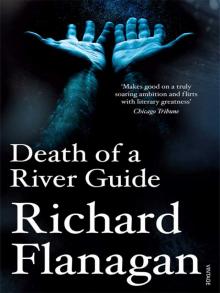 Death of a River Guide
Death of a River Guide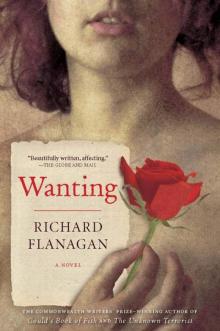 Wanting
Wanting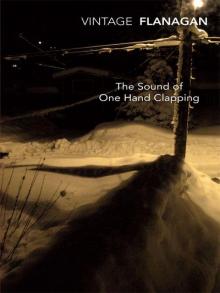 The Sound of One Hand Clapping
The Sound of One Hand Clapping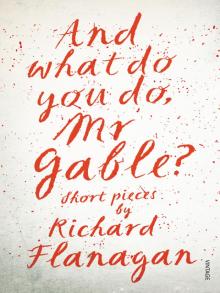 And What Do You Do Mr. Gable?
And What Do You Do Mr. Gable?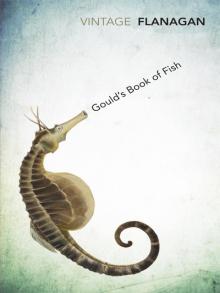 Gould's Book of Fish: A Novel in Twelve Fish
Gould's Book of Fish: A Novel in Twelve Fish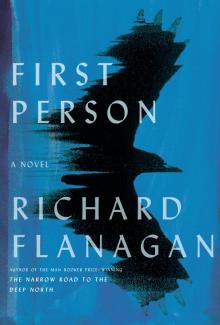 First Person
First Person The Unknown Terrorist
The Unknown Terrorist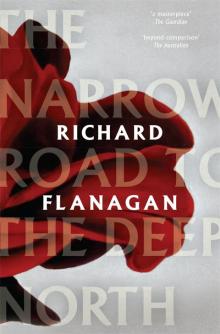 The Narrow Road to the Deep North
The Narrow Road to the Deep North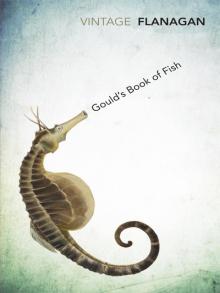 Gould's Book of Fish
Gould's Book of Fish